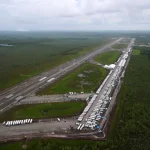
The Full Employment for Robots Act has been signed into law by California Gov. Gavin Newsom.
That’s not really its name. But it may as well be the case, as California’s new fast-food minimum wage will be $20 per hour, $4.50 more than the state’s minimum wage for everyone else.
Fast-food workers, California’s government believes, should be able to make their jobs an ongoing career, rather than be an entry-level stepping stone primarily for teenagers to enter the workforce.
“That’s a romanticized version of a world that doesn’t exist,” Newsom said, according to Sacramento’s KCRA-TV.
“We have the opportunity to reward that contribution, reward that sacrifice and stabilize an industry,” he said.
Stabilize an industry by requiring it to raise wages? Unlikely.
The new $20 rate goes into effect, appropriately, next April 1. And this one is just asking to be hit by the law of unintended consequences, which may be a cruel April Fools’ joke on California employees.
Notice the appearance of kiosks designed to take customers’ fast-food orders. Note the self-checkout lanes at other retail locations that some people are complaining about.
And near Fort Worth, Texas, is a McDonald’s where counter and drive-through clerks have been replaced by machines, according to U.K.’s Daily Mail.
Will this law be detrimental to the fast-food industry in California?
Yes: 100% (6 Votes)
No: 0% (0 Votes)
Robots that can prepare food are also being developed, reported “Future Directions” of the Institute of Electrical and Electronics Engineers.
The ordering kiosks began appearing a few years ago when fast-food workers were voicing demands for $15 per hour. California’s minimum wage is now $15.50 and fast-food workers say that’s still not enough.
The new $20 rate applies only to those working for fast-food companies with more than 60 nationwide locations. The $15.50 rate remains for everyone else.
In a bizarre twist, companies that make their own bread on-premises — such as Panera Bread — are exempted.
What am I saying? Nothing in California should be considered bizarre anymore. It’s just our peek at what Democrats want for the futures of the rest of us, including Newsom as president, although he’s too coy to say what’s becoming obvious.
Underlying the wage increase have been union efforts to organize fast-food workers, KCRA said.
Unions in the state agreed to stop their push to make franchising corporations liable for actions by independent franchisees if the corporations would go along with the $20 wage.
Hospital employees — except doctors and nurses — are seeking a $25 hourly minimum, but Newsom is delaying that because California’s Medicaid program would be required to cough up billions of extra dollars.
Meanwhile, if you as a consumer go to a California fast-food restaurant next year, you’ll probably find food to be more expensive.
And there’s no word on whether or not you’ll be encouraged to tip the robot.








